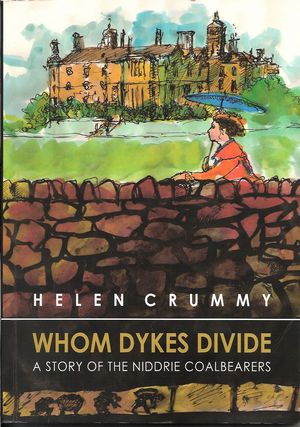Don't Miss Helen Crummy's Novel of Niddrie Colliers' Life: Whom Dykes Divide
Whom Dykes Divide
by Helen Crummy, 2008 162pp £7.95 +pp
ISBN 978 0 9546397 4 7
Small & Crummy Publications, @ 4 Whitehill Street, Newcraighall, EH21 8RA
and from the Prestoungrange Gothenburg, Prestonpans
We would perhaps expect planting primroses and celebrating ‘Freedom Day’ to be auspicious occasions, and so they were. But the first were to flower on a necessarily unmarked grave and the second turned out to be the cruellest of jokes with miner’s freedom unattainable for many for a further 10 years!
This novel is a compelling read not to be missed by any fascinated by or ready to comprehend our community’s history. Helen Crummy’s determination to ensure we remember on whose shoulders we stand hereabouts brings the history of coal mining in the Lothians all too vividly back to life in a family saga spanning six centuries. We share the unspeakable burdens and very occasional delights of the lives of children, women and men working below ground in conditions of slavery to their Lairds. Bess Young of Niddrie is characterised as the most significant chronicler of 12 hours working life each day with the Sabbath off although for many a year the Kirk forbade colliers and their families from attending by imposing impossible apartheid style conditions. She like generations before her had realised that reading and writing were vital if ever the manifest injustices to miners [and salters too] were to be overcome.
click to enlarge cover image

The Wauchope Lairds demonstrated no understanding whatever of the implications of their behaviours towards their serfs. Living in fine style they all too frequently maintained absolute control through a cruel regime of factor and overseer underground and cottage tenancies and pit shop debt above.
The tale is full of man’s cruelty to man, and to children, right through to mid Victorian times when child and female labour below ground was banned. But the increased poverty that ensued was scarcely addressed by those do gooders. The unspeakably dangerous conditions of underground gas, ceiling falls, continual flooding, lung disease and human accident are described for each generation of the Young family across the centuries and their bravery in speaking up against the injustices is honoured as their punishments are mercilessly handed down by the Laird’s very own courts.
Yet despite all the suffering and hardship we see occasional shafts of kindness, thoughtfulness and caring. None is more eloquently captured than the children’s Muckle Adventure to Fisherrow by horse drawn coal train courtesy of the school teacher and Mr Fox. It’s a salutary reminder to us today just how simple it is to bring happiness to so many. Jessie Young’s unexpected concern for the last Lady Wauchope, widowed in the Boer War and losing her twin children soon after birth, as she gave small gifts to the school children, reminds us of the commonality of life’s key concerns such as loneliness on both sides of the dyke.
In every way Helen Crummy’s book is timely – for the author herself and for all today who live often oblivious of the Lothian coalfields and what they meant to almost all our ancestors. There is even a danger, for it truly is such, that what our ancestors struggled to achieve might be overlooked or forgotten as we address today’s and tomorrow’s new challenges. But this well researched novel ensures it all comes back into clear focus in a readily accessible form. Her use of ‘novel’ as opposed to ‘history book’ is inspired and will mean many more can gain understanding and pride in what was suffered and what was achieved. What comes through to the reader is not institutionalised bitterness about the deprivations of the life imposed upon so many, but their absolute determination to achieve a just and humane outcome – one elegantly told example which Nettie Young dreamt of - decent homes to go to and soap and water at the pit head – long long before it came.
Can any of us ever be truly surprised how the strength of the labour movement grew and endured for so long across the Scottish Lowlands?
Published Date: November 2nd 2008
|





